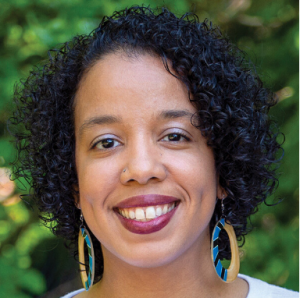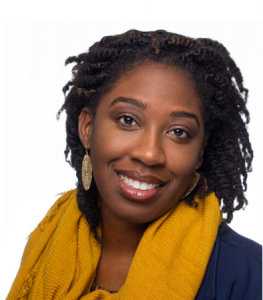Remote Portals: Enacting Black Feminisms and Humanization to Disrupt Isolation in Teacher Education
by Mildred Boveda and Keisha McIntosh Allen
Since 2020, a group of Black scholars affiliated with US colleges of education across four time zones have logged into Zoom for writing sessions. Each morning, the on-screen video images have displayed a range of colorful bonnets, head wraps, T-shirts, and lipsticks donned by Afro-diasporic women. We developed a routine for checking in, writing for 30 to 45 minutes, taking breaks, and repeating this cycle for two hours. During breaks, we not only rested from productivity, but also shared tips like which earrings to wear to events and which podcasts affirmed Black women. We discussed the different challenges we faced as we managed family members falling ill during the COVID-19 pandemic, attempted to meet the needs of the students and teachers in our lives, and followed the activism happening within our individual regions of the country. An improvisational decision to come together in the midst of a global crisis became an intellectual community where we continually support one another.
Affectionately described as “Homeroom”—an allusion to the P-12 schools where we once taught—this Black and womanist space grew to include a dozen scholars. It began in April when Boveda asked Allen if she wanted to join her for morning writing. The two of us, teacher educators and married mothers in heteronormative relationships, needed dedicated time for our scholarship. Our research focuses on preparing educators to teach multiply-marginalized students (Boveda in special education and Allen in urban education contexts). Before COVID-19, we sought culturally situated and community-embedded ways of being in community with like-minded scholars. As the pandemic continued, we invited others who shared this desire. Given that many of us were mothers monitoring our children’s virtual schooling, there were times our children also appeared on screen. Together, we named how we exhausted ourselves meeting the demands of neoliberal (Au, 2017) and westernized (Grosfoguel, 2013) university-based teacher education programs. The restrictions posed during the pandemic slowed us down from the daily pace we kept as we fulfilled multiple roles both within and outside the university.
 Mildred Boveda, EdD, is an associate professor of special education at the Pennsylvania State University. In her scholarship, she uses the terms “intersectional competence” and “intersectional consciousness” to describe teachers’ understanding of diversity and how students, families, and colleagues have multiple sociocultural markers that intersect in nuanced and unique ways. Drawing from Black feminist theory and collaborative teacher education research, she interrogates how differences are framed across education communities to influence education policy and practice.
Mildred Boveda, EdD, is an associate professor of special education at the Pennsylvania State University. In her scholarship, she uses the terms “intersectional competence” and “intersectional consciousness” to describe teachers’ understanding of diversity and how students, families, and colleagues have multiple sociocultural markers that intersect in nuanced and unique ways. Drawing from Black feminist theory and collaborative teacher education research, she interrogates how differences are framed across education communities to influence education policy and practice.
 Dr. Keisha McIntosh Allen is an assistant professor in the Department of Education at University of Maryland, Baltimore County. Dr. Allen’s research acknowledges the full humanity of Black teachers and students by examining how schools can be spaces that are life-affirming. Her current research examines culturally informed initiatives and practices that help to recruit, induct, and retain Black pre-service and in-service teachers in the profession. Her work also examines humanizing pedagogies and their impact in educational spaces. She has published in top peer-reviewed journals focusing on urban and multicultural education.
Dr. Keisha McIntosh Allen is an assistant professor in the Department of Education at University of Maryland, Baltimore County. Dr. Allen’s research acknowledges the full humanity of Black teachers and students by examining how schools can be spaces that are life-affirming. Her current research examines culturally informed initiatives and practices that help to recruit, induct, and retain Black pre-service and in-service teachers in the profession. Her work also examines humanizing pedagogies and their impact in educational spaces. She has published in top peer-reviewed journals focusing on urban and multicultural education.